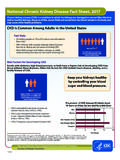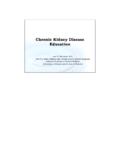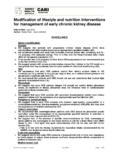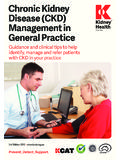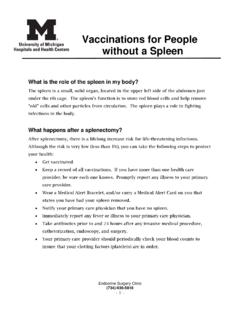Transcription of The Kidney Diet - North Shore Nephrology
1 The Kidney diet How to Eat in Order to Protect Your Kidneys and AVOID DIALYSIS Dr Simon E Prince, FACP, FASN and Rachel Berman RD, CSR The Kidney diet How to Eat in Order to Protect Your Kidneys and Avoid Dialysis Nutrition is an essential part of the therapy for Chronic Kidney disease (CKD). A sound nutritional philosophy can help slow the progression of CKD towards end stage renal disease (ESRD) which is defined as the need for dialysis or transplantation. Eating right can help you to avoid the potentially serious complications of the electrolytes the kidneys regulate. Furthermore, good nutritional habits can help you to control two of the biggest risk factors for CKD: Diabetes and Hypertension.
2 By choosing to maintain the proper diet , you can better control your blood sugar and decrease your blood pressure. This can help you to preserve your Kidney function as well as possibly leading to less of a need for prescription medications. This e-Book is meant to help you guide you to make the best food choices for overall health and to keep you and your kidneys working as well as they can. This information is a general guide. Since each person is unique, your dietitian or Nephrologist will need to supplement this guide and work with you to develop a meal plan, which matches your specific goals. 516. 365. 5570. Created by Dr. Simon Prince, FACP, FASN & Rachel Berman RD, CSR.
3 2. Table of Contents Overview 4. Protein 5. Salt 6. Potassium 8. Phosphorous 10. Glucose 11. DASH diet 12. Minerals 13. Multivitamin 15. Poor Appetite 15. Portion Control 17. Dining Out 18. Food Label Reading Tips 20. Conclusion 22. 3. Overview and diet Prescription When your Kidney function slows, your nutritional status can be greatly affected. This is in part due to the fact that the kidneys are the filtering system in our bodies. Some nutrients may not be excreted as effectively, so you need to limit them in your diet . Some also lose extra protein in the urine and others can develop a decrease in appetite which can lead to protein malnutrition. Below is a general diet prescription.
4 However, this may be modified by your dietitian and/or Nephrologist to meet your specific needs. (This might be overwhelming but keep in mind that this is just to help guide you to eat for the healthiest kidneys possible.). My Daily Goals Your target should be Calories: 30-35 kcal/kg Protein: ~ g/kg Sodium: 2000 mg Potassium: 2000 mg * To figure out your weight in kilograms, divide your weight in pounds by Example: Protein needs for a 150 pound person: 150 = Take that number and multiply by --> 55 grams protein per day. *If you are overweight or underweight, you may need to use your Ideal Body Weight (IBW) to calculate needs. For women - 100 lbs for first 5 feet + 5 lbs for each inch over 5 feet (medium frame).
5 4. Protein Protein is essential for our bodies for growth and is used to build and maintain body mass. It also helps you fight infection. Your needs for protein may be similar to someone without Kidney disease . But, excessive protein can cause a strain on your kidneys and hasten deterioration. Therefore, we suggest eating enough protein for your needs, but being mindful of keeping an upper limit of intake. Furthermore, when the kidneys aren't working very well, a waste product called urea can build up in the blood. This may cause unpleasant side effects like decreased appetite, nausea, changes in taste, and fatigue. Nevertheless, it is very important to get enough protein, especially from high biological value (HBV) sources as below, but not too much which would cause stress to the kidneys.
6 1 serving = 1 ounce = 7 grams protein Serving Size Food Choice Poultry, fish, beef, veal, pork 1 ounce (fresh or frozen). Canned salmon, tuna, Cottage cup cheese, Fresh shellfish: crab, oyster, lobster, clams Egg (or 2 egg whites or cup 1 large substitute). 5 large Shrimp cup Tofu *High sodium protein sources- Limit these and refer to sodium page: Cheese, bacon, canned tuna, luncheon meats, processed fast and convenience meats, pizza, smoked salmon. **High phosphorus protein sources- Limit these and refer to phosphorus page: Beans, peanut butter, nuts, seeds, soymilk. 5. Don't Pass the Salt Salt or sodium chloride is a mineral that assists in regulating the water content of our bodies.
7 The typical American diet has several times the body's daily requirement. You DO NOT need any extra salt in your diet . The desire for salt in foods is actually an acquired taste. You can tame your taste buds by using the below tips. Excess salt can cause fluid retention, which in turn can expand your blood volume. This can lead to high blood pressure and swelling. 1 tsp of salt = 2,300 mg of sodium chloride! Experts recommend sodium intake of less than 2,000 mg/day The first step is to give up the salt shaker. However, many foods contain hidden sources of sodium and most of the salt Americans consume is added to foods during processing. That is why it is important to read food labels whenever possible and ask questions when dining out about preparation.
8 A good rule of thumb is to choose foods which have less than 140 mg sodium per serving. Limit these foods that are known for their high sodium content: Salted snack foods: popcorn, nuts, pretzels, potato and other chips Condiments: soy sauce, BBQ sauce, steak sauce, anything with salt in its name (garlic, sea, onion), gravy, sauce mixes Cured, canned, smoked, or processed meats and fish: anchovies, ham, lunch meats, lox, sausage, bacon, hot dogs Canned entrees and soups: bouillon, broth, consumme Cheese: regular processed and spreads, pizza Boxed convenience foods: Instant rice or noodle, stuffing or casserole mixes Fast Food: commercial hamburgers, pizza, tacos, Chinese food Pickles, relishes, olives, and other pickled vegetables 6.
9 Helpful Sodium Tips 1. When eating out, ask for sauces on the side and go easy on the condiments 2. Use herbs and spices to provide flavor to food instead of salt: Allspice, basil, cayenne pepper, cinnamon, cumin, curry, dill, fennel, garlic, ginger, lemon juice, dry mustard, nutmeg, onion, oregano, paprika, parsley, rosemary, saffron, savory, sesame, tarragon, thyme 3. Buy fresh foods including fruits, veggies, meats, poultry, fish, legumes, eggs, milk, yogurt, and unprocessed grains. 4. Buy low sodium and no-salt added products. There is a plethora on the marketplace including low-sodium soups, cheeses, canned fish, vegetables or vegetable juices, unsalted crackers/popcorn/ snack foods.
10 5. Choose low-sodium meats. Opt for ground beef instead of sausage, roast turkey/ roast beef instead of luncheon / smoked meats. 6. Cook noodles, rice, and hot cereals without adding salt. 7. Look for frozen meals with less than 600 mg sodium per serving. 8. Sodium substitutes are NOT an option if you need to limit potassium intake. Many salt substitutes (such as Mrs Dash) contain potassium in place of sodium. 7. Potassium Potassium is another mineral that helps your muscles and nerves work. If the potassium in your blood gets too high, it may cause a disturbance in the muscles or nerves. The most serious is the cardiac muscle and this can lead to an irregular heart rhythm and even could become fatal.

